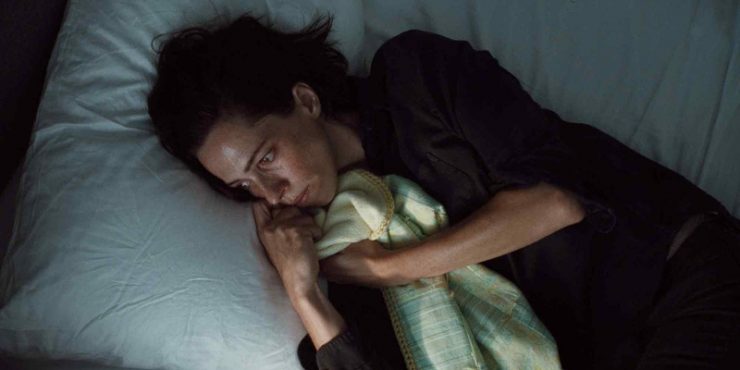How would you behave if the devil returned after twenty years? You might act kind of like Margaret Ballion, a high-ranking medical executive and single parent, whose life is lived by specific rules and precise action. Margaret is played by Rebecca Hall, the veteran actress whose talent is matched by her virtuosity. She’s found success in nearly every genre, in films big and small (last year she premiered her directorial debut, Passing, which she doesn’t act in but which still possesses her poignant, dignified approach to storytelling). In Resurrection, Hall plays a role which has copious physical and emotional demands, stretching herself to the breaking point of sanity, and very nearly teetering off. It’s a remarkable performance, and one that elevates a gritty, chaotic film.
Margaret lives with her daughter, Abbie (Grace Kaufman), who’s nearly eighteen and on the verge of leaving for college. This is giving Margaret some anxiety, and her already strict house rules for her daughter start to get kicked up a notch as Abbie’s departure approaches. Margaret doesn’t have a husband, but she does have regular sex with Peter (Michael Esper), a married man who works in her office. Their sex is fun, but for Margaret it is mostly obligatory, fulfilling a carnal need without the trappings of a relationship. She gave up on long-term male companionship a long time ago. Margaret’s oncoming anxiety gets even worse when she sees David (Tim Roth) at a medical conference. The site of him is so Earth-shattering that she immediately leaves the building and sprints home to make sure Abbie is okay.
I think Resurrection benefits from knowing as little as possible when going in, so I will cease the plot details there. But I will say that writer-director Andrew Semans (in his second feature) takes this seemingly straightforward psychodrama into much darker territory than you could ever predict. Burdened by a past shrouded in harrowing trauma, Margaret’s continued existence is haunted by memories of what she survived. This influences her stringent parenting and even her rapport with employees. In the opening scene, she tells a young woman in her office (played by Angela Wong Carbone) to ditch her aloof, condescending boyfriend with frank instruction. You may think early on that Hall is playing the career-first ballbuster, but the reality is much more complex and chilling.
Hall’s Margaret fluctuates between crushing vulnerability and fierce authority, oftentimes within a single scene. Semans’ subjective approach plays the long game in obscuring our belief in what we see. At the moment you think that Resurrection has laid its card on the table, it gives us a finale so brutally over-the-top that you’re back to second-guessing yourself. Tim Roth’s David is, for Margaret, an unconscionable monster, a lecherous bogeyman whose frumpy exterior belies a blood-curdling evil. Semans waits an incredibly long time to explain what their relationship even is to one another, which helps in building the film’s nightmarish mood, even if it does feel like a narrative cheat at times. The film’s first half is a piercing psychological thriller, but with head-spinning force the last act transforms into unflinching body horror.
It’s hard to believe that a movie like Resurrection – which relies so much on the concealment of basic plot details for a large chunk of the runtime – would work so well without Hall being so phenomenal. Margaret’s extreme paranoia begins to feel something like psychosis to Abbie and Peter. Hall sells the character’s steadfastness, her absolute conviction that what she is experiencing is the horrifying reality. It’s among the best work of a superlative career. Across from her, Roth’s performance returns him to what he does best: being an unpleasant little freak. The veteran character actor whose nefarious charm has tinged several classic villains gets to play one of the more dastardly parts of his career. Hall and Roth are, alone, worth the price of admission for this supremely fucked up movie.
Written and Directed by Andrew Semans










